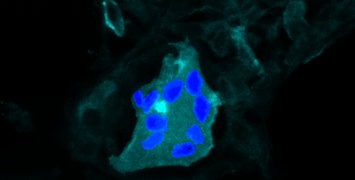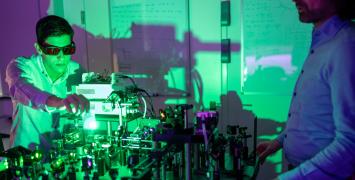Mining Big Data for precious medical insight
The amount of currently available biomedical data is overwhelming. Large databases exist at different scales, from genes, to proteins, to patients' histories. But what do scientists do with all this information? Serbian-born Professor Nataša Pržulj, from University College London, works with Big Data to establish patterns and gain knowledge that could revolutionise how we treat diseases.

Genetic sequencing of entire human genomes, various other new systems-level biotechnologies, advances in computer technology and digital healthcare records have brought a revolution in terms of the quantity of information we have access to. We can map out all the genes of one individual and how the proteins the genes produce interact that may determine the development of diseases. We can see how the same condition has affected different patients and study the underlying causes. We can observe the pathway of a specific drug as it interacts with an organ. But how can we analyse this large amount of data for potential new knowledge and improved understanding of how all these mechanisms collectively interact?
Prof. Pržulj, a trained computer scientist, is applying her expertise to study these complicated biomedical interactions. She was already a recipient of an ERC Starting Grant in 2011, which was at the boundary of computer science and biology, building sophisticated techniques to untangle the complexity of vast protein interaction networks in our cells and complement the knowledge obtained from genetic sequences. In 2017, her project ICON-BIO won her a Consolidator Grant to design holistic, integrative approaches for analysing heterogeneous molecular and clinical data. Her team will focus on redefining accepted paradigms in data science, biology and medicine. The aim is to apply deeper insights in these disciplines to find new treatments for currently incurable diseases.
The project is ambitious – Prof. Pržulj and her team have plans to discover biomarkers for complex and rare diseases, help develop personalised medical treatments based on genomic and other molecular data, and repurpose known drugs for different diseases. The repercussions of her discoveries would impact biomedical research, the pharmaceutical industry, and even research into aging. This work could change how hospitals administer care and monitor at-risk cases, revolutionising the experience of patients worldwide.
Prof. Dr. Nataša Pržulj is an elected academician of The Academy of Europe, Academia Europaea and a Fellow of the British Computer Society. She is a Professor of Biomedical Data Science at University College London (UCL) Computer Science Department. She received received two ERC grants for the ICON-BIO (2018-2023) and BIONET (2012-2017) projects. She was awarded the British Computer Society Roger Needham Award in 2014 for a distinguished research contribution in computer science by a UK based researcher within ten years of their PhD. She held a prestigious USA NSF CAREER Award for the project titled “Tools for Analyzing, Modeling, and Comparing Protein-Protein Interaction Networks” in 2007-2011 at University of California Irvine. Her research has also been supported by other large governmental and industrial grants including those from GlaxoSmithKline, IBM and Google. She was previously an Associate Professor (Reader; 2012-2016) and Assistant Professor (Lecturer; 2009-2012) in the Department of Computing at Imperial College London and an Assistant Professor in the Computer Science Department at University of California Irvine (2005-2009). She obtained a PhD in Computer Science from University of Toronto in 2005.






